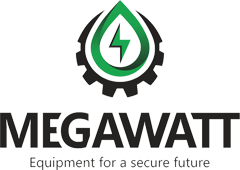What is a diesel generator set?
2023-09-16
A diesel generator set, often referred to simply as a "diesel generator," is a combination of a diesel engine and an electrical generator (alternator) that is used to generate electrical power. It is a self-contained unit designed to produce electricity by converting the chemical energy stored in diesel fuel into mechanical energy and then into electrical energy.
Here are the main components of a diesel generator set:
Diesel Engine: This is the primary component responsible for converting the chemical energy in diesel fuel into mechanical energy. Diesel engines are known for their high efficiency and durability, making them suitable for continuous operation over extended periods.
Generator (Alternator): The generator, or alternator, is coupled to the diesel engine and is responsible for converting the mechanical energy provided by the engine into electrical energy. It consists of a rotor (rotating part) and a stator (stationary part) with coils of wire. As the rotor spins, it creates a changing magnetic field, inducing a flow of electricity in the stator.
Fuel System: This includes the fuel tank, fuel lines, and a fuel pump, which delivers diesel fuel to the engine. The fuel is mixed with air and ignited in the engine's combustion chamber.
Cooling System: Diesel engines generate a significant amount of heat during operation. A cooling system, often involving a radiator and coolant, is used to dissipate this heat and maintain the engine at an optimal operating temperature.
Exhaust System: This system includes a muffler and exhaust pipe that remove the combustion gases produced during the engine's operation.
Control Panel: The control panel contains instruments, switches, and controls that allow operators to start, stop, monitor, and manage the operation of the generator set. It may also include safety features and indicators for parameters like voltage, current, and frequency.
Voltage Regulator: A voltage regulator ensures that the generator produces a stable and consistent voltage output, which is important for the proper functioning of electrical devices.
Battery and Starting System: Diesel engines typically require a battery to provide the initial electrical power needed to start the engine. Once running, the engine's alternator generates electricity to recharge the battery.
Diesel generator sets are widely used in various applications, including:
Standby Power: They are often installed in critical facilities (such as hospitals, data centers, and industrial plants) to provide backup power in case of a grid outage.
Prime Power: In locations where a stable electrical grid is unavailable, diesel generators can serve as the primary source of electricity.
Construction Sites: Diesel generators are frequently used on construction sites to power tools, equipment, and temporary structures.
Remote Areas: They are used in remote or off-grid locations, such as in rural communities, mining operations, and telecommunications sites.
Marine Applications: Diesel generator sets are commonly used in marine vessels for onboard power generation.
Overall, diesel generator sets provide a reliable and efficient means of generating electricity across a wide range of applications and environments.

























